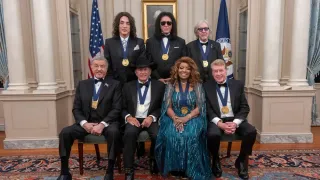February 10, 2022
The Doctor Will See You Now – In the Hallway
Amelia Templetown, Oregon Public Broadcasting READ TIME: 5 MIN.
Nurse Heather Gatchet's shift in the emergency department at Salem Health's Salem Hospital in Oregon typically starts at 6 a.m. Before that, she packs her daughter's lunch, drinks tea, and – to stave off her panic – calls her mom on the way to work.
"My mom's like my cup of coffee," Gatchet said, her voice breaking, "to mentally psych myself up for what I'm walking into." Gatchet's mother reminds her she is good at what she does and she's loved. After she walks in and sees her colleagues in the break room, Gatchet said, her panic lifts: "This is my team, and it feels safe again."
More than 700 days have passed since the first case of covid-19 was confirmed in Oregon. Like the rest of the country, Oregon had far more cases in early 2022's omicron surge than in any previous peak of the pandemic. New cases have begun to recede, but the sheer volume of infections continues to swamp hospitals nationwide. Salem Hospital, where Gatchet works, is adapting, yet again, to accommodate more patients than it is licensed to hold.
Dr. Peter Hakim works alongside Gatchet. Recently, his mother-in-law had a heart attack and was taken to a small, rural hospital. She needed specialty care that wasn't available there. "They could not find a bed for her anywhere in Washington or Oregon for 24 hours," Hakim said. "So she was sitting in this small six-bed emergency department and couldn't get transferred out."
His mother-in-law eventually got the care she needed. A lot of people, Hakim said, "are not as lucky."
The Salem Hospital emergency department has 100 beds. To handle the influx of people seeking treatment, hospital staffers have made space by putting dozens of beds in the halls.
By noon, those hall beds are occupied, and ambulances are pulling up to the bay behind the hospital – seven, eight, nine at a time.
The pressure builds through the afternoon as more patients arrive. Three years ago, treating people in the hallways would have been an extraordinary measure. Now Gatchet and Hakim prepare for it every day.
Some of what Hakim does as a physician, like cutting off a patient's clothing to examine a broken hip, is too sensitive for the hallway. He said he took one patient into the bathroom to complete an exam: "That is the one private space we could find at the time."
The hospital has been above 100% capacity for months, with patients doubled up – and even occasionally tripled up – in their rooms, according to hospital executives. Salem Health allowed a reporter to shadow Gatchet and other staff members on Jan. 27, which proved to be the day with the highest number of covid patients yet – 122 people, nearly 1 in 4 patients in the hospital had the virus.
About 70% of those covid patients were admitted with respiratory symptoms, while the rest were asymptomatic cases discovered during admissions screening, according to hospital executives.
But those 122 patients were just part of the strain from the pandemic. If the health system were a line of dominoes, emergency medicine would be at one end. But the domino that tipped first and knocked the other parts down is long-term care. Statewide, more than 70% of long-term care facilities had a staff member or resident test positive for covid in January, with many reporting full-blown outbreaks.
Low-paid caregivers are burned out and quitting the long-term care sector in huge numbers – it's one of many industries competing for workers in a crunched labor market experiencing record resignations and retirements.
The covid outbreaks and staffing shortages mean Salem Hospital can't discharge patients to nursing homes. Those facilities are closed to new admissions.
It's also harder to find support for patients who need assistance to return to their homes after an illness or disabling accident. The pandemic has made hospital beds, in-home caregivers, and even wheelchairs all more difficult to get.
Dr. Sarah Webber, a hospitalist, said that before the pandemic, coming up with a safe discharge plan for patients took her team a few days. "And now sometimes it is taking a week or two. And I do have some patients that have been here for several weeks," she said. Of the 20 hospital patients she was responsible for the prior week, eight were stable and ready to leave but didn't have a discharge plan.
Statewide, almost 600 patients are ready to leave the hospital but waiting on a discharge plan. One in 10 patients in an Oregon hospital bed could leave but has nowhere to go.
As in the delta wave, a majority of the covid patients hospitalized at Salem Hospital are people who haven't been vaccinated.
Patients infected with the omicron variant are, on the whole, requiring less oxygen and less intensive care. "I'm seeing more patients live," said Jackie Williams, a respiratory therapist who works on every floor of the hospital. "It's like a little glimmer of hope."
Many of the less critical covid patients are behind closed doors in the hospital's medical-surgical unit. Being hospitalized with covid – even a milder variant – is a lonely experience.
In the hallway on Jan. 27, a nurse manager spoke with the wife of a covid patient who had been transferred from the emergency room. The manager was explaining that the patient's wife needed to leave the unit because she was exposed to covid while caring for her husband and could infect hospital staff members or patients. The wife quietly fought back tears as she handed over a bag with glasses and a clean change of clothes for her husband.
"Does he have a cell phone?" the nurse manager asked. "The nurses, they can help him do FaceTime so you can talk to him, OK?" She added: "I'm sorry."
An Oregon National Guard member deployed to the hospital to help the nurses pushed a cart full of supplies down the hall and called out a greeting. The guard members provide a little lift – and a show of solidarity – to staff members who are feeling ground down.
For Webber, it stings that many of her patients don't take her advice to get vaccinated after they recover. "People come to the hospital sick and they want me to help them, but they won't trust me over the basics of how to prevent it," she said.
At home, she has less patience for her children – and they seem to need her more. Her 6-year-old daughter recently asked why Webber couldn't just stay home with her.
"She asked me, 'Are the sick people more important than me?'" Webber said.
In recent days, hospitalizations in Oregon appear to have reached their peak and are plateauing. Salem Hospital staff members hope that as the omicron wave subsides, the pressure will ease up a bit.
Even as it does, it's still flu season, and health issues that have worsened through the pandemic in Oregon will resurface. "It might not be breathing problems, but it's alcoholism. It's suicide," said Williams, the respiratory therapist. "It's traumas, it's all these other things that are what the world is dealing with after coming out of two years of a pandemic. And those are critical illnesses too."
This story is part of a partnership that includes�Oregon Public Broadcasting,�NPR�and KHN.
KHN (Kaiser Health News) is a national newsroom that produces in-depth journalism about health issues. Together with Policy Analysis and Polling, KHN is one of the three major operating programs at KFF (Kaiser Family Foundation). KFF is an endowed nonprofit organization providing information on health issues to the nation.
USE OUR CONTENT
This story can be republished for free (details).
Subscribe to KHN's free Morning Briefing.






